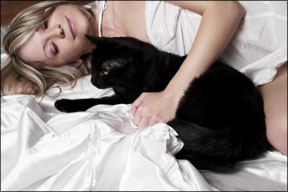Dear Elizabeth: Thanks for responding in your February 2009 column to my question about night-time yowling. To answer your question, Decker is just 11 months old. A recent physical exam showed that he is in top form with no health problems. It was interesting to read all of the reasons why older cats may meow at night. Now Ill know what to do if Decker starts yowling at an advanced age, but in the meantime, I am hoping that we can get him to sleep through the night! I would like to take you up on your offer to expand on ways to get younger cats onto a more appropriate daytime/nighttime schedule. Every night at about 3 AM, Decker wakes me up with his meowing. Ive tried to ignore him, but after an hour of listening to his constant talking, I get up and try to figure out what hes yowling about. Ive tried feeding him, reassuring him that all is well and Ive even resorted to squirting him with a water pistol, but nothing seems to work. Bev Caldwell 288 Since Decker is a young cat with no health problems, its apparent that some behavioral issues are behind his disruptive night-time yowling. Night time wakefulness is a common problem, particularly in young cats, but the good news is that most cats can be encouraged to change their ways. In your desperate attempts to get him to quit yowling, you have inadvertently reinforced his behavior – he meows and you give him attention or food. In his mind, even negative attention (like being squirted with a water gun) is better than no attention, so youre going to have to prepare yourself for an epic battle of wills. You can win, but only if youre consistent in your refusal to give him any attention at all during these night-time yowling sessions. Your goal is to get him onto a day/night schedule thats compatible with your lifestyle. Right now, he probably spends much of the day catnapping while youre away at work, leaving him with excess energy at night. Instead of feeding him a big meal for breakfast and another big meal when you get home, lets see if we can get him to work for his food. If he is used to eating canned food, give him a smaller amount of food than usual for breakfast. Buy a food dispensing toy (one that he has to chase around) and load it up with dry food. While youre away, he should keep busy “hunting” for food. Dont feed him dinner when you get home; instead, spend some time playing with him and feed him a big meal right before you go to bed at night. A full stomach will encourage him to sleep through the night. Be sure to schedule interactive play sessions at regular times during the evening hours. Invest in a bunch of toys which you keep hidden and rotate them to maintain Deckers interest. A wand with a feather at the end or a fishing pole with a toy tied to the fishing line will encourage stalking, chasing and pouncing. Place a knot at the end of a long string and drag it around the house, encouraging Decker to run after you. Balls and catnip toys can be tossed for Decker to bat around. Paper bags or boxes are great fun to jump into. Toss bits of food for Decker to chase. Provide climbing trees or window perches with bird feeders outside the window, or a fishtank to provide for some daytime entertainment. You may wish to take Decker outside, using a leash and harness – sniffing all the enticing scents outdoors and doing a bit of exploring will make his life more interesting. Save some time for grooming sessions and for cuddling together. Discourage naps during the evening hours. You may even wish to adopt a second young cat to keep Decker company while youre at work. If possible, have Decker sleep in a room far from your bedroom and outfitted with a comfortable bed, his food and water dishes and a litter box and above all, ignore any yowling. By providing for Deckers social and play needs, and by ignoring inappropriate behaviors, Ill bet that within a few weeks, you and Decker will be sleeping better at night! Love, Elizabeth 



